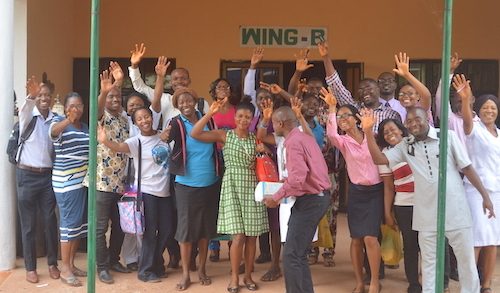We just spent a week at Federal Teaching Hospital Abakaliki (FETHA) in Ebonyi State. What were we doing there? Helping health workers save lives (and save themselves too!)
Health workers are often on the frontlines of infectious disease outbreaks. By simply doing their jobs, they are often exposed to patients infected with dangerous diseases, which can easily be passed to other patients, colleagues, family members, visitors, and more.
So what can be done?
One of DRASA’s core goals is ensuring that health workers – who serve us by keeping us healthy and safe – do not lose their lives in the line of duty like Dr. Adadevoh and her team.
To achieve this goal, we train health workers in an area of clinical medicine called infection prevention and control (IPC).

What is IPC?
Infection prevention and control (IPC) might sound complicated but it’s just a mix of science and practiced behaviors that help prevent patients, health workers, and others from being harmed by deadly diseases, while also ensuring quality health care is provided.

IPC is not widely taught or practiced throughout Nigeria. In fact, in November 2018, DRASA was contacted by a doctor from Federal Teaching Hospital, Abakaliki (FETHA) who asked if we could support FETHA in the area of IPC for Lassa fever.
Why Lassa Fever?
FETHA – which has over 4,000 staff, 720 patient beds, and 2 campuses/locations – has been battling against Lassa fever and its recurring outbreaks in the region. In the last 2 years (2017 – 2018), FETHA lost 6 health workers and 43 patients to the virus and since 2005, FETHA has lost 14 health workers and 113 patients to the virus.
Also, Ebonyi state in Nigeria recorded the highest number of Lassa fever cases and deaths in 2018 (among the general public as well as among health workers), and as the foremost teaching hospital located in the state capital, FETHA often manages these cases.

What did DRASA do to help FETHA?
With the support of our partners at University of Lagos College of Medicine (CMUL), Nigerian Infection Control Association (NICA), and Infection Control Africa Network (ICAN) – we worked with the management of FETHA to conduct a 3-day Basic Lassa Fever IPC Training.

We trained 48 key staff (doctors, nurses, hygienists, and laboratory staff) from various departments/units across FETHA using a mix of case studies, quizzes, group activities, worksheets, simulations, demonstrations, and practicals.
We also conducted on-site visits and assessments of FETHA’s patient wards in order to proffer practical IPC solutions based on their working conditions.

What were the results?
We were able to increase knowledge of proper risk assessment, how to implement IPC practices, and best practices in detecting and triaging Lassa fever patients. Additionally, everyone trained is passing on the training to their colleagues who were not able to attend.
“I work in the Accident and Emergency department and I just wanted to come to the training to fill in the gap. I never knew that I would learn something new. Thank you.”
-Doctor
But ultimately, we can say that as a result of our time at FETHA, staff confidence in their ability to perform their duty despite any outbreak or suspected cases has increased, and that alone is the biggest show of success.
“As for this training, justice was done to IPC. We’ve learnt the essence of protecting ourselves, colleagues and the patients. We were more concerned about protecting ourselves alone. Now, we know we need to protect our colleagues and patients.”
-Nurse
We really connected with all the health workers we met and we look forward to continuing to work with them to save lives and prevent the spread of infectious diseases.











